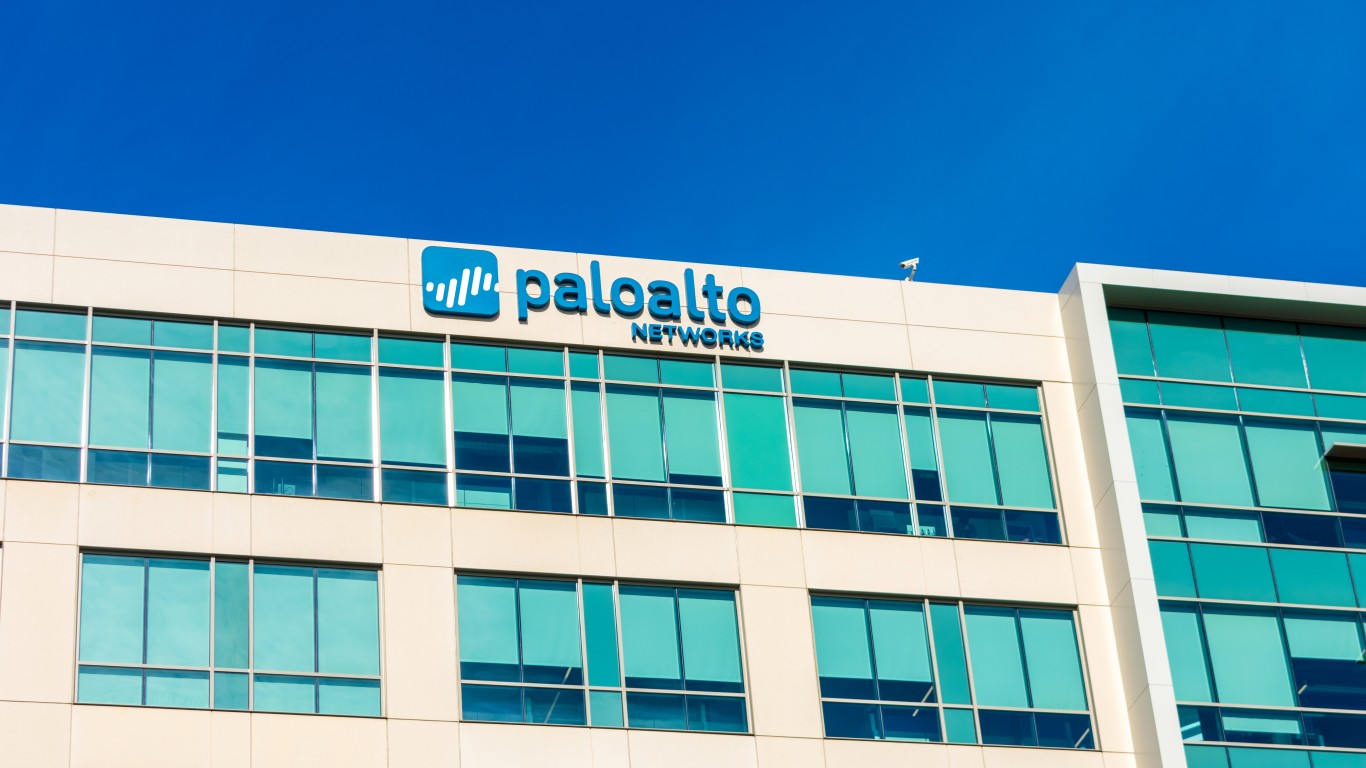

According to Statista, “the global cost of cybercrime is expected to surge in the next four years, rising from $9.22 trillion in 2024 to $13.82 trillion by 2028.”
Cybercrime is certainly one of the biggest and most urgent concerns in the industrialized commercial world. It is virtually impossible to find a company that doesn’t have some aspect of its business online, which makes it a potential target.
Unsurprisingly cybersecurity has become a huge standalone business. A recent report by MarketsandMarkets anticipates that the cybersecurity industry will grow to $298.5 billion by 2028. Clearly, the growth rate of cybersecurity has to pick up speed to catch up with and reduce the exponential lead that cybercrime has over it. Fortune cited the Top 5 cybersecurity companies by market cap, and topping the list was Palo Alto Networks (NASDAQ: PANW).
In addition to being the current 800 lb. gorilla in the cybersecurity realm, there are are several fundamental reasons why there is analyst anticipation for Palo Alto Networks to announce a forward stock split sometime in the not too distant future:
Not Their First Rodeo

Although Palo Alto Networks has only been a public company since its 2012 IPO, it is no stranger to forward stock splits. In 2022, Palo Alto Networks executed a 3-for-1 reverse split, effectively increasing from approximately 112 million shares to over 338 million. At the time, the stock price was heading towards a lofty $550, so reducing it to under $120 and adding liquidity to the float was welcomed by the market. Investors have responded by more than doubling the price of the stock since, which is over $280 at the time of this writing.
Using A.I. for Cybersecurity

One of Palo Alto Networks’ biggest strengths is their complete end-to-end menu of cybersecurity software SaaS and hardware solutions, which detect and intercept cloud-based and wireless virtual firewall cyber threats as well as hard-wired ethernet and physical firewall threats.
Granted, SaaS and cloud-based cybersecurity has outpaced physical security. Palo Alto Networks’ own ratio has shifted from nearly 50/50 in 2017-8 to a subscription dominant 82% revenue ratio going into 2024.
Palo Alto Networks’ incorporation of A.I. and machine learning into its SaaS cybersecurity platforms has greatly enhanced its effectiveness in adapting to new threats, and created a spiraling increase of add-on service, both on-premises as well as in subscriptions, which generate high levels of recurring revenues. Not to mention the fact that profit margins for SaaS are much higher than for hardware and on-premises platforms.
Palo Alto Networks’ Prisma Cloud platform is a prime example. Individual corporate customers purchasing five or more modules increased 166% in Q1 2024 vs 2023.
Addressing the Investment Community

Institutional investors, which make up over 80% of Palo Alto’s current common stock ownership, certainly would be supportive of a forward stock split, since the boost to the price inevitably improves their portfolio balances. Vanguard Group is the largest shareholder, with roughly 7.5% of the outstanding shares. Argus Research anticipates that generative AI will create “a more toxic” cybersecurity environment, so AI equipped cybersecurity solutions like Palo Alto Networks’ Prisma Cloud and other products will likely see demand upticks. As such, Argus is targeting PANW stock to go to $336.
It’s no surprise that individual investors are more reluctant to allocate investment dollars into a handful of shares of a high-priced stock and tend to throw more money into stocks with lower share prices.
The market’s anticipation will also be strong, given that forward splits usually signal management’s confidence in the company’s future prospects, and institutions will welcome the greater liquidity afforded by large numbers of individual investors also holding stock.
With earnings continuing in the double digits and with cybersecurity concerns a presumptive ongoing priority for the foreseeable future, Palo Alto Networks’ stock should continue to appreciate accordingly. It makes sense for the company to enact another forward split to get more people to join the party.
Smart Investors Are Quietly Loading Up on These “Dividend Legends” (Sponsored)
If you want your portfolio to pay you cash like clockwork, it’s time to stop blindly following conventional wisdom like relying on Dividend Aristocrats. There’s a better option, and we want to show you. We’re offering a brand-new report on 2 stocks we believe offer the rare combination of a high dividend yield and significant stock appreciation upside. If you’re tired of feeling one step behind in this market, this free report is a must-read for you.
Click here to download your FREE copy of “2 Dividend Legends to Hold Forever” and start improving your portfolio today.
Thank you for reading! Have some feedback for us?
Contact the 24/7 Wall St. editorial team.



